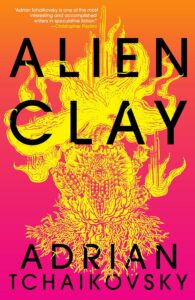
This review is based on an eARC (Advance Reading Copy) provided by the publisher via NetGalley in exchange for an honest review. Alien Clay will be released on September 17, 2024.
As far as I can tell, Adrian Tchaikovsky has been a wildly prolific sci-fi/fantasy author for a solid decade by now, but after getting popular attention with Children of Time, he’s been increasingly on the radar in my circles the past few years. Because he’s so prolific, it can be hard to keep up with the new releases, but when I saw that Alien Clay would be set in a labor camp on a strange planet full of bizarre biology, I knew this would be one I absolutely had to make time for.
Alien Clay follows an academic whose revolutionary politics saw him on the wrong side of a government that strictly monitors research that may threaten the worldview on which they’ve based their power. And so he’s given a one-way ticket to another planet full of strange creatures—a place that would’ve been a research dream under other circumstances—where he’s forced to work alongside other failed revolutionaries and assorted malcontents, trying to find a government-sanctioned explanation for the life that exists now, all while keeping himself and his fellows from suffering the grisly fate of far too much of the expendable labor. And avoiding that fate may take a lot of science. Or a revolution. Or both.
It’s clear from the beginning that the revolutionary politics are going to play a key role in Alien Clay—in case you were tempted to confusion, the three sections of the story are titled Liberté, Égalité, and Fraternité—but there’s a whole lot of time exploring and musing over a deeply strange ecology. The setting of Alien Clay feels a little bit like Jeff VanderMeer’s Area X, and Tchaikovsky is absolutely willing to hammer home that weirdness, even if it requires a lull in the plot. But Tchaikovsky’s tone is different than VanderMeer’s, and even if Alien Clay leans into the weirdness, there’s always an explanation and a plot acceleration in the offing. And when it does all come together, all those strange pieces truly click wonderfully into place, leading to a finish that is equal parts thrilling and satisfying, elevating everything that came before it.
Those elements that came before always had something to offer, because Tchaikovsky is a good storyteller, but they didn’t quite live up to my sky-high expectations. A number of the story elements, from the cynical academic main character to the labor politics to the exploration of intelligent life beyond humanity, are things I’d seen Tchaikovsky explore in previous books, so there weren’t necessarily fresh themes to provide an early hook. The main character didn’t have the vibrancy to carry the narrative on his own, and Tchaikovsky isn’t one to try to carry a story on mood, a la Annihilation. All of it made for an interesting story, but there wasn’t any element that truly carried the tale—at least not after factoring in a reader who has seen many of the tricks before. And so the book was heading firmly toward good-but-not-great territory before the closing convergence made a pretty firm run at greatness, one that took so many of those tricks I’d seen before and made them feel fresh in the ways they were combined. Even it I didn’t have that feeling from start to finish, it’s still a book I’m very glad to have read.
Ultimately, Alien Clay combines a lot of Tchaikovsky’s favorite themes into a single package. If you’re new to his work, it’s a great chance to see what he’s about, even though I’d personally prefer Children of Time or Elder Race. If you’ve read and loved his work in the past, and you don’t mind revisiting a few common threads, you’ll probably have a good time. And even if you, like me, don’t have any particular fondness for the cynical narrator that features in so much of his work, this one comes together in a way that brings a whole lot to like.
Recommended if you like: weird first contact, revolutionary politics, Tchaikovsky’s catalog.
Can I use it for Bingo? It’s hard mode for Survival, and it also features Reference Materials, Characters with Disabilities, Dreams, and Criminals. It’s Published in 2024, it’s arguably Set in a Small Town depending on your feeling about research outposts, and it’s a prime candidate for Judging a Book by its Cover. If you’re not fussy about hard mode, this is a Bingo MVP.
Overall rating: 16 of Tar Vol’s 20. Four stars on Goodreads.
